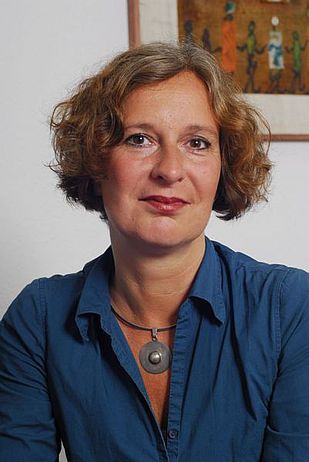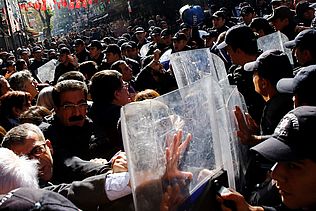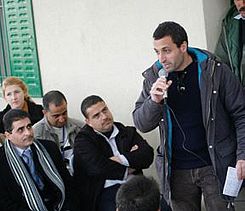Since the start of 2012, Mali has been overwhelmed by events. The country was shaken by a Tuareg uprising, followed in March by a military coup in the capital Bamako, the North suffered an escalation of terror by religious radical militias, leading to the exodus of hundreds of thousands. This difficult conflict situation also led to a change in the work of medico's partners in Mali.
What have the consequences been of the escalation in violence for civil society efforts at democratisation and the work of the medico partners AME (Association Malienne des Expulsés) and ARACEM (Association des Refoulés d‘Afrique Centrale au Mali)?
{sabinejpg class="links"}
Our partners in Mali are grassroots organisations working primarily on behalf of migrant rights. AME has so far concentrated on assisting migrants in Bamako who were deported from Europe and the Maghreb, while ARACEM has focused on people from outside Mali hoping to travel to Europe but stuck here. The military coup in March 2012 and subsequent developments have shifted their focus to issues involving the general situation in Mali, and they have subsequently developed a major political engagement within civil society groups.
What are the effects on your specific work of the coup and the military intervention under French leadership?
Both the conditions and the priorities of our work have changed. In the past few months both partners have operationalised their mandates so that they now support all those involuntarily displaced persons. After radical religious groups took control of the north of the country, many migrants travelling to the Maghreb have been stuck here. These people are particularly vulnerable, as they have no social safety net in the region. Very early on, in March 2012, AME made a number of journeys to get a picture of the situation there. Through their contacts, they were then able to assist migrants, primarily in the border areas with Algeria and Mauretania. Since the military escalation and the intervention, deportations to Mali from the Maghreb and Europe have stopped. Previously, aid to deported migrants was the daily work of our partners AME and ARACEM. Now, however, more and more internally displaced Malians from the north are banging on our partners' doors. Our partners’ engagement ranges from humanitarian aid through political activities to protect the rights of the internally displaced persons, to assisting their grassroots organisations.
How would you describe the situation of the internal exiles?
Around half of the people displaced by the conflicts (c. 250,000 people) fled across the borders to neighbouring countries where they are housed in camps and centrally 'administered', primarily in Mauretania and Burkina Faso. The special aspect about the situation in Mali itself is that there only a very few refugee camps here. The displaced persons who stayed in the country (c. 200,000 people) are predominantly living with host families, with relatives or friends who are often themselves living in poverty. These 'private solutions' often conceal the misery of the refugees. Fortunately, however, the old social networks and family ties in Mali are still functioning very well.
What are the implications of all this for the work of medico's partners?
On balance, the whole situation is overloading their capacity and their resources, confronting them with demands and expectations which go beyond their means. They are confronted with misery on a daily basis, but can only provide a limited amount of help. Even so, they do the best they can. medico has also provided additional funds to assist the internal exiles. One way of dealing with the overload is certainly to set priorities.
What role does the colonial heritage play in Mali's crisis?
The centralist state on French lines is a very serious problem in Africa. Mali is a large and extremely heterogeneous country where very different interests and cultural traditions have to be brought together. There have been attempts at decentralisation in Mali since the start of the 1990s. This was one result of the revolution of 1991, but it has not been completed. One reason for the failure was the influence of the elites, who tried everything to retain the centralist structure. There was a very simple reason for this – control of resources is simpler with a centralist state than a decentralised structure.
Let's talk about minerals. Is access to minerals in Mali and neighbouring countries such as Niger a factor in the conflict itself and in France's decision to intervene?
If you look at the distribution of wealth in Mali and the role of the international groups which are expropriating society's wealth through extraction of minerals, it is clear where the problem lies: 95% of the profits from gold mining leave the country, and only 5% remain. This 5% in turn funds 70% of the national budget. Part of the new vision for Mali has to be a more transparent and equitable distribution of the nation's wealth. This would have positive effects on the entire service sector, including the health sector. A political vision aimed at the disintegration of the country would be in the interests of Mali's neighbours and should also be welcomed in France. In the current conflict, control of the north is a central element, as there are expectations of very large mineral reserves there. Almost all the areas for prospecting are in the north, and there are many countries active here, with Italy and Algeria in addition to France. Besides geostrategic and security policy interests, such as securing transport routes, the control of access to minerals accordingly plays a central role in the internal dynamics, as well as in external intervention.
Even before the coup, Mali experienced growing civil-society criticism of the prevailing policies and the political class, focusing on the unequal relationship between the central state and the periphery and on corruption. Is there a danger that this democratic movement will be weakened by the military deployment?
The efforts at democratisation will undoubtedly be adversely affected by the intervention. Freedom of movement and assembly is restricted by military actors, with the result that civil society organisations can no longer articulate their views publicly as in in the past. For example, the 'white march' supported by our partners had to be cancelled. Freedom of the press is also restricted. For journalists, access to the disputed areas is severely limited, information is only reaching the outside world in a very selective manner. You can basically say that the social debates have been polarised by the intervention. Internal issues have taken a back seat to the one major issue – the military option. Currently, there are virtually no negotiations on civil options, as the conditions for these seem not to exist. In addition, the intervention is creating enormous potential for mobilising religious radicals. This is evident in Mauretania, where the religious radicals are on a massive upswing, among other things b3n3efiting from the intervention in the neighbouring Mali, where the already shaky social consensus is in danger of further fragmentation.
So, can we say that the military intervention is threatening to cement or legitimate existing political relationships?
I think so, yes. The international political system functions very strongly through representation. At the moment, Mali is only represented internationally by a transitional government without democratic legitimation. This is very unsatisfactory. It is also true that all reform efforts have currently been forced into the background, because the only important thing for now is to secure the status quo after the withdrawal of the French troops. And there's no doubt that the status quo is worse than the situation before the coup.
Even if forecasts seem difficult just now, what will the next steps be for medico's partners?
First, it is a matter of securing their work and the continuing existence of their structures in the new conditions. At our last meeting in Mali in December 2012, it was clear that the situation can change from day to day, and that our partners have to be flexible in adapting their work. Currently, the AME is preparing to expand the measures for assisting internally displaced persons and their host families. This involves not only material aid: the central element is transferring the empathy they have acquired from their own experience of exile to an approach involving psychosocial work. Personal experience and close contact are things that characterise self-help organisations and distinguish them from professional NGOs. AME and ARACEM have created spaces for encounters, for targeted assistance, and also for political engagement.
How form does this take in concrete terms?
AME realised very early on that supplying internal exiles with humanitarian aid is not enough – you have to strengthen their self-help structures. Indeed, they have organised themselves into self-help and grassroots groups in Bamako, and AME is trying to support them in these efforts, and at the same time to get them into dialogue with the local population in Bamako to create awareness and understanding of the situation of the displaced people. The goal is to develop work with the self-help groups into dialogue, through public events, press work and personal encounters.
How is ARACEM as an initiative of non-Malian migrants acting in this situation?
Interestingly, the work that AME is doing today with internally displaced persons is strongly reminiscent of what it was doing years ago with ARACEM. At the time, ARACEM was a very precarious self-help organisation trying to articulate its interests and create a mutual support network. AME helped with this, and the extent of its success is clear now – in 2012 ARACEM itself provided emergency aid to internally displaced Malians, with medico's assistance. For example, the group in Bamako distributed emergency aid materials, which attracted a lot of recognition locally in a situation where there had been growing distrust of foreigners in recent years, to an extent never seen before in Mali. In this situation, ARACEM showed solidarity with exiled Malians, in the process integrating itself more strongly into Malian society. This is an example of a positive development in the middle of the major crisis.
The interviewer was Anne Jung
In 2012 medico provided support totalling € 79,000 to our partners in Mali, AME and ARACEM



